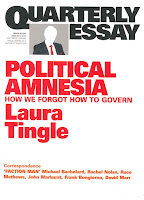 Staff review by Chris Saliba
Staff review by Chris SalibaIn this well considered essay veteran political journalist Laura Tingle calls for a restoration of more conservative values: a public service that remains non-political, is stable and maintains its traditions.
Perhaps one of Australia's best and most clear eyed political commentators, Laura Tingle presents her second Quarterly Essay. Her first essay examined Australia's entitlement culture and how it generates resentment, even anger. This new essay looks at the “political amnesia” of our governing elites. Essentially, Laura Tingle argues, our institutions have lost much of their memory. There's no sense of history, of looking back at how things were done successfully in the past. Tingle confesses to often being baffled by new policy ideas, because anyone with enough political memory would know they are often repeats of history.
There are two main problem areas that Political Amnesia examines. Firstly, the public service. Tingle argues that the public service's institutional memory has been greatly reduced over the last twenty years. A weakened public service is a serious threat to the proper running of government, as it knows how the machinery of government actually works. The public service started to see its decline under the Howard government (Tingle notes the Whitlam government was also a culprit.) Governments unnecessarily critical of the public service tended to sack department heads and replace them with more politically acceptable appointments. This changed the culture and made it more timid, unwilling to give frank and fearless advice. Some of the worst excesses of this behaviour were seen under the Abbott government with its treatment of Gillian Triggs.
The second area the essay examines is the 24-hour news cycle. While not totally responsible for our bad political environment, it's a major contributor. The world of social media and never ending news coverage means we live in a perpetual present, devoid of memory. The internet is also putting huge pressure on news rooms and journalists to produce more stories. In depth analysis of issues is missing because there simply isn't the time or money.
As the reader has perhaps guessed, this is pretty glum reading. The only real hope that Tingle holds out is that our new prime minister, Malcolm Turnbull, will be able restore the public service to something of its former self. In many ways, Political Amnesia is a call for a return to conservative values: a public service untouched by the often excitable politics of the day, one that remains stable and maintains its traditions.
Political Amnesia: How We Forgot to Govern: Quarterly Essay 60, by Laura Tingle. Published by Black Inc. ISBN: 9781863957861 RRP: $22.99
To sign up for our monthly newsletter, featuring new releases, book reviews and favourite articles from around the web, click here.
